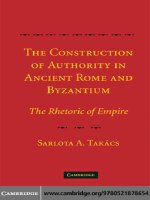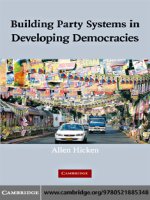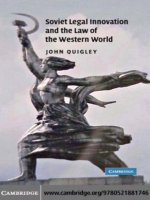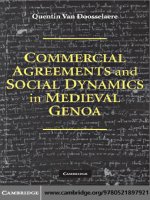cambridge university press islam and social change in french west africa history of an emancipatory community mar 2009 kho tài liệu bách khoa
Bạn đang xem bản rút gọn của tài liệu. Xem và tải ngay bản đầy đủ của tài liệu tại đây (2.27 MB, 0 trang )
This page intentionally left blank
islam and social change in french west africa
history of an emancipatory community
Exploring the history and religious community of a group of Muslim Sufi mystics
who came largely from socially marginal backgrounds in colonial French West
Africa, this study shows the relationship between religious, social, and economic
change in the region. It highlights the role that intellectuals – including not only
elite men, but also women, slaves, and the poor – played in shaping social and
cultural change and illuminates the specific religious ideas on which Muslims
drew and the political contexts that gave their efforts meaning. In contrast to
depictions that emphasize the importance of international networks and antimodern reaction in twentieth-century Islamic reform, this book claims that, in
West Africa, such movements were driven by local forces and constituted only the
most recent round in a set of centuries-old debates about the best way for pious
people to confront social injustice. It argues that traditional historical methods
prevent an appreciation of Muslim intellectual history in Africa by misunderstanding the nature of information gathering during colonial rule and misconstruing the relationship between documents and oral history.
Sean Hanretta is currently Assistant Professor of History at Stanford University.
He received a B.A. in history from the Colorado College and an M.A. and Ph.D.
in African history from the University of Wisconsin. He has published research
on precolonial Zulu history, on mining camps in the Belgian Congo, and on the
history of Islam in West Africa. His work has appeared in the Journal of African
History and Comparative Studies in Society and History. His current research
focuses on wedding and funeral reform efforts among Muslims in Ghana.
african studies
The African Studies Series, founded in 1968, is a prestigious series of monographs,
general surveys, and textbooks on Africa covering history, political science,
anthropology, economics, and ecological and environmental issues. The series
seeks to publish work by senior scholars as well as the best new research.
editorial board
David Anderson, University of Oxford
Catherine Boone, University of Texas at Austin
Carolyn Brown, Rutgers University
Christopher Clapham, University of Cambridge
Michael Gomez, New York University
Nancy J. Jacobs, Brown University
Richard Roberts, Stanford University
David Robinson, Michigan State University
Leonardo A. Villalo´n, University of Florida
A list of books in this series will be found at the end of this volume.
Islam and Social
Change in
French
West Africa
history of an
emancipatory
community
sean hanretta
Stanford University
CAMBRIDGE UNIVERSITY PRESS
Cambridge, New York, Melbourne, Madrid, Cape Town, Singapore, São Paulo
Cambridge University Press
The Edinburgh Building, Cambridge CB2 8RU, UK
Published in the United States of America by Cambridge University Press, New York
www.cambridge.org
Information on this title: www.cambridge.org/9780521899710
© Sean Hanretta 2009
This publication is in copyright. Subject to statutory exception and to the
provision of relevant collective licensing agreements, no reproduction of any part
may take place without the written permission of Cambridge University Press.
First published in print format 2009
ISBN-13
978-0-511-51789-1
eBook (NetLibrary)
ISBN-13
978-0-521-89971-0
hardback
Cambridge University Press has no responsibility for the persistence or accuracy
of urls for external or third-party internet websites referred to in this publication,
and does not guarantee that any content on such websites is, or will remain,
accurate or appropriate.
Contents
List of maps and figures
Acknowledgments
Note on orthographic conventions
Abbreviations used in references
Introduction
Implicit knowledge and the colonial episode
Traditions, repertoires, and sources
Structure of the argument
page ix
xi
xiii
xv
1
4
11
22
Part One: ‘‘The Suffering of Our Father’’:
Story and Context
Sufism and Status in the Western Sudan
The Western Sudanic tradition
The Middle Senegal Valley: colonial intervention
and the reconfiguration of authority
Conclusions
29
32
2.
Making a Revival: Yacouba Sylla and His Followers
Kae´di, Nioro, and the light of a new reform
Yacouba Sylla
Revival
Conclusions
60
62
71
74
82
3.
Making a Community: The ‘‘Yacoubists’’
from 1930 to 2001
A prison community
Fodie Sylla and the end of militancy
Consolidating the community
Return to activism
From history to myth
Conclusions
83
83
89
93
99
110
116
1.
vii
45
59
viii
Contents
Part Two: ‘‘I Will Prove to You That What I Say Is True’’:
Knowledge and Colonial Rule
4.
5.
Ghosts and the Grain of the Archives
The grain of the archives: Islam, knowledge, and control
Ghostwriters in the archives: religious competition and
borrowed knowledge in the colonial library
Myths of Yacouba, myths of empire
121
126
History in the Zaˆwiya: Redemptive Traditions
Synecdoche and Sufism: Yacouba Sylla, tilmıˆdh shaykh
hamahu’llaˆh
A community of suffering
God’s work: the zaˆwiya, the plantation, and the nation
Conclusions
159
138
151
162
171
179
182
Part Three: ‘‘What Did He Give You?’’: Interpretation
6.
Lost Origins: Women and Spiritual Equality
Women as participants
Mahr, adulthood, and honor
The vision of Fatima
Struggles for control
189
191
195
200
204
7.
The Spiritual Economy of Emancipation
Defining slavery and abolition
Paths to personhood
Conclusions
208
210
217
224
8.
The Gift of Work: Devotion, Hierarchy, and Labor
Work’s gifts
The gift of history
Conclusions
227
228
240
249
9.
‘‘To Never Shed Blood’’: Yacouba, Houphoue¨t,
and Coˆte d’Ivoire
Defining free labor
Giving and moral tutelage
Moral geography
253
256
260
269
Conclusions
Gifts of the Past
275
275
Glossary
Note on References
Index
Books in This Series
289
293
295
307
List of maps and figures
Maps
1
2
3
French West Africa c.1930
Kae´di c.1930
Coˆte d’Ivoire c.1938
page 30
61
84
Figures
1
2
Yacouba Sylla and elders of the community,
Gagnoa, 1941 (Courtesy Ahmadou Yacouba Sylla)
Yacouba Sylla and Fe´lix Houphoue¨t-Boigny, Abidjan,
December 1977 (Fraternite´ Hebdo, 23 December 1977)
ix
165
254
Acknowledgments
The research for this book was made possible by an IPFP award from the
Social Science Research Council in 1998, an IDRF award from the SSRC and
the American Council of Learned Societies in 2000–1, and a Fulbright–Hays
award during that same year. Foreign Language Area Studies fellowships from
the University of Wisconsin’s African Studies Program and from the Center
for European Studies facilitated language acquisition, and a University Fellowship from Wisconsin funded the graduate training that preceded the
research. A reduced teaching load at Stanford University provided time to
hew the book out of the dissertation on which it is based.
The original dissertation was read by Tom Spear, as well as by Florence
Bernault, Michael Chamberlain, Jo Ellen Fair, David Henige, Ousman Kobo,
and William Allen Brown, all of whose interventions greatly improved its
quality. Mostly anonymous comments during presentations in 2004–6 helped
sharpen the ideas and inspired some of the larger framework. Portions of
the revised work were commented on by Jean-Loup Amselle, Philippe Buc,
Bob Crews, J. P. Daughton, Julia Elyachar, Steven Feierman, Jim Ferguson,
Zephyr Frank, John Hanson, Peter Hudson, Joel Samoff, Priya Satia, Caroline
Winterer, and anonymous reviewers at the Journal of African History and
Comparative Studies in Society and History, all of whom offered insightful
queries, critiques, and suggestions for further investigation. Students at Stanford, Dartmouth, and Colorado College forced me to sharpen my thinking,
and Piotr Kosicki provided useful research assistance from France. Generous
full readings were given by Martin Klein and the anonymous reviewers at
Cambridge University Press. David Robinson’s efforts went beyond the call of
duty. Richard Roberts heroically read the entire manuscript twice (at least)
and offered suggestions and insights that helped make the book much more
readable than it otherwise would have been. Endless discussions with Ousman Kobo, Sue O’Brien, and others have shaped my thinking about West
African Islam and the paradoxes of a social history of religion as has the work
of Benjamin Soares. Eric Crahan has been a very understanding editor.
The assistance of the Sylla family and the rest of the Yacoubist community
is gratefully acknowledged; this work would have been impossible without
xi
xii
Acknowledgments
their cooperation, and though they do not generally share my interpretations
of their history, they have been very gracious in their response. Ahmadou
Yacouba Sylla, Maıˆtre Cheickna Sylla, Oumar Sylla, Maıˆtre Aliou Cisse´,
Yacouba Traore´, and Cheickh Cisse´ in particular deserve thanks, as does
Cheickna Yacouba Sylla, caliphe and chef de famille. In West Africa, countless
others provided testimony, archival assistance, and/or friendship that made
the work possible, including Nixon, Aba and Oumar Sylla, Sidi Muhammad,
Moussa Coulibaly, the Sy family, and Yaba Diabate. Archivists and officials
greatly facilitated the work, particularly in Dakar, Koulouba, and Abidjan.
Louis Brenner and Adama Gnokane very generously allowed me to use documents they had gathered over the course of their own research and copies of
their own unpublished works, and both have been stimulating interlocutors.
Brenner in particular has been an inspiration. Other intellectual debts are too
diffuse to specify, but have hopefully been acknowledged in situ. My deepest
thanks go to Kim, Caoimhe, and our families for companionship and emotional and intellectual support. This book is dedicated to them and to the
memory of William Allen Brown.
None of these people has incurred any debts, obligations, or responsibilities in relationship to this text – those are all reserved to the author. In the
words of Georg Simmel: ‘‘to be allowed to contribute is itself a gain . . . the
response of the other, an unearned gift.’’
Portions of this book appeared as ‘‘Gender and Agency in the History of a
West African Sufi Community: The Followers of Yacouba Sylla,’’ Comparative Studies in Society and History 50:2 (2008), 478–508; and as ‘‘‘To Never
Shed Blood’: Yacouba Sylla, Fe´lix Houphoue¨t-Boigny and Islamic Modernization in Coˆte d’Ivoire,’’ Journal of African History 49:2 (2008), 167–90.
Permission from Cambridge University Press to use both is gratefully
acknowledged.
Note on orthographic conventions
I have used Anglicized versions of the names of former French colonies (e.g.,
Upper Volta, Senegal) except in the case of Coˆte d’Ivoire, which is the official,
untranslatable name of the modern state. Other geographic names have been
standardized to accord with current spellings, with the exception of Kae´di
(rather than Kayhaydi or other variants). For the transcription of Arabic
words I have adopted a modified version of the system used in Sudanic Africa,
dropping diacritics from consonants but keeping those for vowels. For other
West African languages I have tended to adopt the most recent transcription
conventions but have simplified spellings for typographical ease (eg. ‘‘ng’’ for
the Mande ‘‘g’’, ‘‘ny’’ for ‘‘3’’, ‘‘b’’ for the Pulaar-Fulfulde ‘‘F’’). With a few
exceptions (eg. Sn: modini, Ar: hadaˆyaˆ), nouns from Arabic and West African
languages are pluralized as if they were regular English nouns. Since most
proper nouns used are best known in their French forms, I have so written
them, unless there is no standard French spelling, in which case I simply
transliterated. Ethnonyms have not been pluralized. I have standardized the
spelling of the name of the ‘‘Tal’’ family so as to make obvious the connections among its various members. I have preferred Hamallah over Hamahu’llah because that is the way he is best known to Mande-language speakers.
Although Yacouba Sylla himself is best known to his community as Yaxuuba
(only rarely as Yacquˆb), he and his community have always used ‘‘Yacouba’’
in communicating with outsiders. Spelling in quotations has been left
unchanged. All translations are my own, except where otherwise indicated.
xiii
Abbreviations used in references
AHR:
ANCI:
ANM:
ANMt:
ANS:
BCEHS-AOF:
BSOAS:
BTLC:
CAOM:
CEA:
CHEAM:
CSSH:
EI2:
FOCYS:
HIA:
IJAHS:
ISSS:
JAH:
JOAOF:
JOCI:
MAMMP:
SA:
UNESCO:
American Historical Review
Archives Nationales de la Re´publique de la Coˆte d’Ivoire,
Abidjan
Archives Nationales de la Re´publique du Mali, Koulouba
Archives Nationales de la Re´publique Islamique de la
Mauritanie, Nouakchott
Archives Nationales de la Re´publique du Se´ne´gal, Dakar
Bulletin du Comite´ d’Etudes Historique et Scientifique sur
l’Afrique Occidentale Franc¸aise
Bulletin of the School of Oriental and African Studies
Bureau Technique de Liaison et de Coordination
Archives Nationales de la France: Centre des Archives
d’Outre-Mer, Aix-en-Provence
Cahiers d’Etudes africaines
Centre des hautes e´tudes d’administration musulmane
Comparative Studies in Society and History
Encyclopaedia of Islam. 2d ed. Leiden, 1960–2002
Fondation Cheick Yacouba Sylla
The History of Islam in Africa, ed. by Nehemia Levtzion
and Randall L. Pouwels. Athens, OH, 2000
International Journal of African Historical Studies
Islam et socie´te´s au sud du Sahara
Journal of African History
Journal official de l’Afrique Occidentale Franc¸aise
Journal official de la Coˆte d’Ivoire
Yale Malian Arabic Manuscript Microfilming Project
Sudanic Africa
United Nations Educational, Scientific, and Cultural
Organization
xv
Introduction
the central events in this story took place in the riverside town of Kae´di in the French colony of Mauritania on February 15, 1930.
That morning, two men, Mamadou Sadio and Dieydi Diagana, prayed
together in a mosque in the neighborhood of Gattaga. Both members of
the town’s Soninke ethnic minority, Mamadou Sadio was the son of one of
Kae´di’s Islamic scholars, and Dieydi Diagana was the French-appointed chef
de village for Gattaga, Kae´di’s Soninke enclave. This day, in the middle of the
holy month of Ramadan, was supposed to have been a day of reconciliation,
for the two men had been on opposite sides of a conflict that had unsettled
Kae´di for months and were praying together to demonstrate their commitment to peaceful coexistence.
The conflict had begun the previous August 1929, when a young man
named Yacouba Sylla arrived in town and began preaching a message of
religious and social reform that took Gattaga by storm. A Sufi teacher,
Yacouba Sylla had incurred the hostility of the local representatives of the
French Empire and the disdain of Kae´di’s elite by calling for radical changes
in social and religious practice and by claiming authority out of proportion to
his age and his rather minimal formal education. He claimed instead to derive
his authority from a controversial holy man named Ahmad Hamallah, from
Nioro in Mali, who at the time was being detained by the French administration. Despite local opposition, Yacouba Sylla quickly gathered a large following
from among Kae´di’s minority Soninke population. Yacouba’s supporters came
from a wide variety of backgrounds. Some were merchants; a few were important scholars; many were slaves or former slaves; others belonged to stigmatized
occupational castes; some were merely poor. In December of 1929, the French
deported Yacouba from Kae´di and then, in January, placed him in detention
in Sassandra, in the colony of Coˆte d’Ivoire. In his absence, his followers
continued to spread his ideas, and the religious revival became more intense.
By January 1930, it involved over 600 people who had come into frequent and
increasingly violent conflict with other residents of the town. Largely on the
receiving end of much of the violence, Yacouba’s followers were attacked in
the town’s streets and saw their homes burned and their shops looted.
1
2
islam and social change in french west africa
All this, however, was supposed to have been settled by the meeting in
Gattaga’s main mosque on the morning of February 15, 1930. Yet just hours
later, apparently under the leadership of Mamadou Sadio who claimed to be
acting in Yacouba’s name, the revivalists staged a large demonstration, winding their way past their opponents’ homes and shops and past the French
administrative buildings. Though it is not clear exactly what happened during
the course of that day, by the end of it nineteen men and three women, all
followers of Yacouba Sylla, had been killed, shot by the town’s guards. Several
more died from their injuries over the next few days, while over 100 people
were rounded up and arrested, sentenced to prison or detention, and exiled to
the far corners of the French Empire in West Africa.1
In the years that followed, Yacouba Sylla and his followers experienced a
dramatic reversal of fortune. Despite the deaths and detentions, the group
stayed in contact over the next several years, writing to one another from
various prisons and assuring their families left behind that they would soon
be together again. In the late 1930s, the administration gradually released the
‘‘Yacoubists’’2 and was surprised when most of them decided to gather in
Coˆte d’Ivoire rather than return to Mauritania. Yacouba himself moved to
the Ivoirian town of Gagnoa in 1939, established a center for Sufi devotional
practices (called a zaˆwiya), and turned his attention to commerce and plantation agriculture. Gathering his followers around him to form a new community, they established a series of successful plantations and a transport
company. By the 1940s, Yacouba was well known throughout much of West
Africa as both a successful merchant and an important religious teacher.
Relations between his followers and those of other religious leaders with ties
to Hamallah in Nioro were rarely smooth, but he attracted the attention of
the great intellectual, Amadou Hampaˆte´ Baˆ, and became friends with the
politician Fe´lix Houphoue¨t-Boigny, and the latter relationship brought him
1 Arreˆte´ 225, Gouv. -Ge´n. AOF (Carde), 27 January 1930, pub. JOAOF, February 15, 1930. See also
Gouv. -Ge´n. AOF (Carde) to Min. Col., Rapport #133AP/2, 13 Avril 1930 and Arreˆte´ 807, Gouv. Ge´n. AOF 11 Avril 1930 (CAOM 1Affpol 2802/6 dossier 3). ‘‘Liste de Yacoubists de´ce´de´s a` Gattaga:
15-2-1930,’’ (ANMt E2-34). A copy of this last file and others from Nouakchott were graciously
provided to me by Professor Adama Gnokane of the Universite´ de Nouakchott, to whom I am
deeply indebted.
2 The name of the community created by Yacouba Sylla is a very contentious issue among his
followers because of the implications it has for relations with other followers of Hamallah. See
Boukary Savadogo, ‘‘La communaute´ ‘Yacouba Sylla’ et ses rapports avec la Tijaˆniyya hamawiyya,’’
in La Tijaˆniyya: Une confre´rie musulmane a` la conqueˆte de l’Afrique, ed. Jean-Louis Triaud and
David Robinson (Paris, 2000), pp. 271–280. I have avoided using the term ‘‘Yacoubism,’’ but since
even those who emphatically reject the uniqueness of Yacouba’s religious teachings accept that his
followers’ social organization was unprecedented, I have used the term ‘‘Yacoubists’’ to designate
those who consider themselves to be members of the community of disciples of Shaykh Hamallah
organized and led by Yacouba Sylla.
Introduction
3
into political life as a symbol for African entrepreneurialism and the drive for
self-rule. An ally of Houphoue¨t-Boigny’s Parti De´mocratique de la Coˆte
d’Ivoire (PDCI) and the pro-independence Union Soudanaise-Rassemblement De´mocratique Africain in Mali, Yacouba Sylla was an important, if
unobtrusive, figure in Coˆte d’Ivoire in the 1960s, 1970s, and 1980s. Yacouba
passed away on August 11, 1988, leaving behind him an influential community
but little private wealth. Yacouba’s followers had shunned all personal property, sharing all possessions in common and maintaining a tight solidarity.
His sons inherited leadership of the community, playing significant political
and religious roles in Mali and Coˆte d’Ivoire in the first decade of independence and remaining well-known figures throughout the region and among
Francophone African Muslims in the diaspora.
Fascinating in its own right, the history of Yacouba Sylla and his followers
provides a unique glimpse inside some of the most poorly understood
dynamics of West African societies. Though hardly representative, the experiences of the Yacoubists refract the twentieth century in new and useful ways.
French administrators had sought to systematically manage the practice of
Islam in their African possessions in order to bring it into alignment with
their vision of modernity and make it serve as a bulwark for the state’s
authority. At the same time, officials’ half-hearted efforts to eliminate slavery,
their inconsistent projects to channel labor into cash cropping, and the arbitrary exercise of power by poorly trained and underfunded administrators
brought about dramatic and unexpected changes in the ways communities
were organized and the ways individuals understood their position in society.
West African Muslims were neither passive witnesses to these changes nor
purely reactive. They drew creatively on centuries of Islamic thought and
social experimentation to craft new identities and communities out of,
among other things, the changes brought by the French. Administrators
and colonial politicians spoke of freedom, development, and modernization
in alien and often hollow terms; but the followers of Yacouba Sylla gave new
meaning to these ideas, making them central themes in a mystical Sufi practice that looked little like the enlightenment-based liberal republicanism governors hoped to create or like the reformist Islam promoted by modernizers
elsewhere. The Yacoubists used the memory of the suffering of the symbolic
father whom they called ‘‘Ba Yaaxuba,’’ ‘‘Father Yacouba,’’ to fold the dominant ideologies of the century into a redemptive, cosmic narrative in which
they themselves helped fulfill a social revolution set in motion by the Prophet
Muhammad himself.
This book attempts to trace the origins and development of the ‘‘Yacoubist
community’’ through the period of French colonial rule and up to the
present. It is also an intellectual history of leaders and followers in the community that strives to illustrate the internal architecture of their thinking, its
4
islam and social change in french west africa
relevance for broad moral and theoretical questions, and the social and political uses to which it was put. I argue that the social and ideational roots of the
revival launched by Yacouba Sylla in 1929, as well as of the new kind of society
he helped establish in the late 1930s, can be traced back several centuries
before his birth. The book illustrates the way the Yacoubists drew connections
among phenomena that had their own histories stretching from the transAtlantic slave trade in the seventeenth and eighteenth centuries, to the Sufi
networks established by Sidi al-Mukhtar al-Kunti in the eighteenth century,
to the violent reform movements of the eighteenth and nineteenth centuries,
and to the intellectual crisis precipitated by imperial conquest. The results
suggest new ways of looking at the place of women and gender in Islamic
history in West Africa, at the changes in labor regimes and local political
patronage in the early twentieth century, at the new forms of religious practice that emerge along with the personalization and commoditization of
spiritual authority, and at the complex circuits through which discourses like
modernization and development traveled in becoming the common currency
of postcolonial African political culture.
implicit knowledge and the colonial episode
In the late 1960s, the eminent scholar and leader of the ‘‘Ibadan’’ school of
African history, J.F. Ade Ajayi, advised historians to remember that colonialism
was merely ‘‘an episode’’ in the African past, albeit an important and traumatic
one. Ajayi feared that the seductive pull of Europe’s interpretive vision and of
the colonial archive as an empirical resource would drown out histories centered on ‘‘African’’ voices and worldviews.3 For many good reasons, Ajayi’s
enjoinder and the nationalist historiographic moment of which it was a part
hold little sway among current European and North American scholars of
Africa. Like colonial analysts before them, nationalist historians tended to
evaluate African cultures by comparing them to European ones. They deployed
a series of interpretive dichotomies – between collaboration and resistance,
between local and ‘‘world’’ religions, between capitalist and precapitalist
economies, and so on – that made Ajayi’s distinction between Europe-centered
histories and Africa-centered ones a distinction of essence and substance. They
tended to downplay the impact of colonial transformations of political economy and ignored the way nationalist projects and their elite leaders had come
to be saturated with colonialist ideologies.
In the face of these problems, a very different approach has come to
dominate since the 1980s. Colonial rule is now seen as a tentative, halting
3 Jacob F. Ade Ajayi, ‘‘Colonialism: An Episode in African History,’’ reprinted in Tradition and
Change in Africa: The Essays of J. F. Ade Ajayi, ed. Toyin Falola (Trenton, NJ, 2000), pp. 165–74.
Introduction
5
experiment, whose subjects were able to play a decisive role by facilitating
certain courses of action while blocking or raising the relative costs of others.
What was thought of as the precolonial past has been revealed as, in great
measure, the product of an imagination shared by colonial observers and
African elites, and reference to its explanatory value is seen as romantic at
best, essentialist at worst. Instead, today’s historians describe the interplay
between colonial ‘‘projects’’ and African ‘‘responses’’ in ways that account
for, and indeed relish, moments where African initiatives ‘‘disturbed’’ or
‘‘changed the trajectory’’ of European undertakings. Under the rubric of an
‘‘imperial turn,’’ such work has had a salutary effect on European history,
helping displace its own narratives of self-contained nations and autonomous colonial metropoles. In terms of African historiography, it has directed
attention to the vibrancy and ‘‘modernity’’ of recent African societies and
assimilated recognition of the impact of European rule without endorsing the
self-representations of colonialists or their apologists.4
Steven Feierman has, however, noted that histories that are always cautious
to frame African agency within the constraints and discourses of domination –
and indeed, which deem it the height of agency to ‘‘displace’’ or ‘‘appropriate’’ those constraints and discourses – can reinforce the false universalism
according to which only stories that employ explanatory contexts grounded
in knowledge implicitly understood to be shared by the historian and her or
his audience can be articulated in professionally acceptable languages. Historical objects depend on the other histories readers are assumed to know and
those that a particular study is taken to inform. Dividing up the African
twentieth century into stories that reflect the fate of European concepts,
beliefs, or practices – like labor, commoditization, or citizenship – generates
histories that have meaning only in their ‘‘shared relationship’’ to such concepts, reinforcing the coherence of European knowledge and the fragmentation of all others.5 The very act of referring to the continent in the early
twentieth century as ‘‘colonial Africa’’ makes it clear that one must know
4 For the African cases, good introductions are Frederick Cooper, ‘‘Conflict and Connection:
Rethinking Colonial African History,’’ American Historical Review 99 (1994), pp. 1516–1545;
Cooper, Decolonization and African Society: The Labor Question in French and British Africa (Cambridge, UK, 1996); and Gregory Mann, ‘‘Locating Colonial Histories: Between France and West
Africa,’’ AHR 110:2 (2005). In a comparative context, see Nicholas Thomas, Colonialism’s Culture:
Anthropology, Travel and Government (Princeton, 1994); Cooper and Ann Laura Stoler, eds.,
Tensions of Empire: Colonial Cultures in a Bourgeois World (Berkeley, 1997); Catherine Hall, ed.,
Cultures of Empire: Colonizers in Britain and the Empire in the Nineteenth and Twentieth Centuries,
A Reader (Manchester, 2000); and Cooper, Colonialism in Question: Theory, Knowledge, History
(Berkeley, 2005).
5 This is the powerful argument of Steven Feierman, ‘‘Colonizers, Scholars, and the Creation of
Invisible Histories,’’ in Beyond the Cultural Turn: New Directions in the Study of Society and Culture,
ed. Victoria E. Bonnell and Lynn Hunt (Berkeley, 1999), p. 185.
6
islam and social change in french west africa
something about colonialism (and thus about Europe) to understand it, while
the concrete knowledge about Africa mobilized by ‘‘imperial turn’’ histories
of Europe is comparatively thin. Knowledge of, say, French history has applicability and meaning in many locations outside the metropole, while knowledge of ‘‘local’’ African history is taken to gain meaning only by being
connected to ‘‘broader’’ circuits. Regional or even continental interactions
are overlooked in favor of localized studies where the interplay of appropriation and displacement can become a major part of the story, or ‘‘translocal’’
studies where appropriation and displacement are the story. Integration in
African history – indeed, the meaning of the field as a whole – only comes
through the colonial rubric.
One reason for this is that Africa as such has proven largely unsatisfactory as
an alternative framework for historical analysis. Partially this is because the
continent’s size and diversity mean that the ground that it provides for narratives
is typically thin; partially it is because ‘‘Africa’’ as a category owes so much to
Europe itself that the idea that it can provide an alternative locus of explanation
is probably illusory.6 The choice between treating African history as part of a
fully integrated, universally intelligible world history and separating it out completely, relegating it to the timeless past of the ‘‘other,’’ is, however, a false one,
one that ultimately serves to justify the neglect of contextualizing knowledge that
could build on stories centered outside the metropole. It is a duality that has
particularly pernicious consequences for African intellectual history, which can
be nothing other than the history of derivative discourses, and for the history of
Muslim peoples in Africa, whose long-term trajectories, insofar as they are
considered at all, are attached like an appendage to the Middle East. For that
reason, this book adopts instead a regional approach, taking the loosely bounded
area of the ‘‘Western Sudan’’ – roughly from the Senegal River Valley in the west
to the bend of the Niger River in the east, from the desert in the north to the
southernmost extent of Mande-speaking traders – as its setting, not in the sense
of a culture zone that offers ready-made explanations or bounded repertoires,
but as a privileged space for the interconnection and accumulation of stories.
Although the new colonial and imperial histories have generally paid little
attention to questions of Islamic reform or Muslim social change, the most
innovative works on Islam in twentieth-century West Africa have been
broadly consonant with such approaches. They have emphasized the ways
the socioeconomic and political dispensations ushered in by European rule
spurred the development of new forms of religious authority and new
6 V. Y. Mudimbe, The Invention of Africa: Gnosis, Philosophy, and the Order of Knowledge (Bloomington, IN, 1988); Martin W. Lewis and Ka¨ren E. Wigen, The Myth of Continents: A Critique of
Metageography (Berkeley, 1997), ch. 4. That ‘‘Europe’’ is equally tendentious a category has, of
course, been one of the greatest incentives for turning instead to ‘‘empire.’’
Introduction
7
religious institutions.7 Even those historians who work across the colonial
divide tend to privilege the last decades of the nineteenth century and the first
decades of the twentieth, seeing in them a profound rupture in which older,
dead-end forms of Islamic authority and organization were replaced, in a
kind of a ‘‘shakeout,’’ by modern ones better adapted to the new conditions
of European liberalism and capitalist development.8
The same basic pattern is apparent in large-scale studies of socioeconomic
change in the twentieth century, particularly in those that focus on the question of
‘‘free labor.’’ Abandoning older debates about whether precolonial African labor
was ‘‘overexploited’’ or ‘‘underutilized,’’ or over the conditions for the emergence of a modern working class, more recent approaches have lingered over the
complex, heterogeneous patterns that emerged in the twentieth century. They
have highlighted the colonial use of forced labor and coercive military recruitment, which they present as an ‘‘intermediary’’ stage between premodern labor
regimes and true labor markets. Attention is given to the political, social, and legal
institutions that enabled the functioning of these hybrid forms of political economy, which in turn appear as effectively sui generis.9 Yet there has been little
investigation into the meanings of work within African societies, so powerful is
the implicit teleology of the inexorable progression toward liberal capitalism.10
Decades ago, Sara Berry suggested that the development of a satisfactory
interpretation of the transformation of African economies during the colonial
period would be best served by recognizing that economic values are the ‘‘outcome
of historical interaction between practices and concepts of production’’ with
7 On the personalization of religious authority, see the contributions to Jean-Louis Triaud and David
Robinson, eds., Le temps des marabouts: itine´raires et strate´gies islamiques en Afrique occidentale
franc¸aise, v. 1880–1960 (Paris, 1997); and Benjamin F. Soares, Islam and the Prayer Economy: History
and Authority in a Malian Town (Ann Arbor, 2005). For new institutions, see those as well as the
essays in Robinson and Triaud, La Tijaniyya; David Robinson, Paths of Accommodation: Muslim
Societies and French Colonial Authorities in Senegal and Mauritania, 1880–1920 (Athens, OH, 2000);
and Louis Brenner, Controlling Knowledge: Religion, Power and Schooling in A West African Muslim
Society (Bloomington, IN, 2001). Brenner’s earlier work generally took its frame of reference from
local religious traditions rather than from French colonial policy, but Controlling Knowledge bears
traces of the imperial turn in its focus on European conquest as marking a fundamental epistemic
rupture in Islamic discourse. The most important works of the older, philological school of Islamic
studies are exceptions to this trend, but they generally take very little notice of the colonial state or
questions of social and political authority at all.
8 This is the basic thesis that David Robinson has put forth across a number of publications during
the last several years. See the most mature expression of it, in Robinson, Paths of Accommodation.
9 This is the overarching argument of the major work of one of the founders of the new colonial
history, Frederick Cooper, although it is also a perspective shared by many historians of slavery.
See Cooper, Decolonization and African Society. See also Richard Roberts, Litigants and Households:
African Disputes and Colonial Courts in the French Soudan, 1895–1912 (Portsmouth, 2005).
10 For an exception that proves the rule, see Johannes Fabian, ‘‘Kazi: Conceptualizations of Labor in a
Charismatic Movement among Swahili-speaking Workers,’’ Cahiers d‘e´tudes africaines 13:50 (1973),
293–325.









